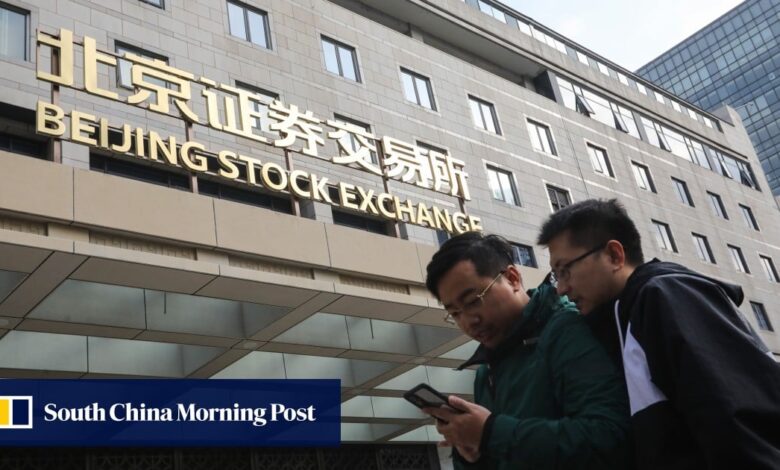Beijing Stock Exchange reforms will boost appeal, valuations of companies listed on China’s smallest bourse, say analysts

[ad_1]

The push is part of a drive by the CSRC to shore up China’s US$11 trillion stock market after top Communist Party officials asked it to bolster the capital market and revive confidence in a late July Politburo meeting.
“The policy support for the Beijing exchange has exceeded the market’s expectations and all these reform measures are expected to be put in place in the following half year,” said Liu Jing, an analyst at Shenwan Hongyuan Group in Shanghai. “These measures will have a profound impact and be conducive to the bourse’s development in the long run. With the price-to-earnings multiple for the Beijing market near its record low, it’s due for a decent rebound.”
The Beijing Stock Exchange 50 Index jumped almost 6 per cent on Monday, heading for its biggest gain on record. Still, the gauge has dropped more than 9 per cent this year, extending a 5.8 per cent loss in 2022.
In comparison, the Shanghai exchange has 2,243 companies that are capitalised at 48.5 trillion yuan, while the Shenzhen bourse accommodates 2,819 listings with a total market capitalisation of 32.6 trillion yuan.
The daily turnover of the Beijing exchange has average 1 billion yuan, according to the CSRC. That is a tiny proportion of the average daily trading volume of about 400 billion yuan each for the other two bourses.
Currently, only overseas traders that are approved under the qualified foreign institutional investor (QFII) programme can trade on the Beijing exchange and it is still off limits to overseas investors participating via the cross-border exchange link with Hong Kong, which gives them access to most of the companies trading in Shanghai and Shenzhen.
Good quality companies will be fast-tracked when they apply to list on the Beijing exchange, while more brokerages will be approved as market makers to provide liquidity, and private-equity funds will be allowed to increase their stakes in companies trading on the bourse, according to the new guidelines.
“The guidelines will promote deepened reforms of the exchange and make it better serve the purpose of serving innovative small and medium-sized enterprises in the aspect of listing supply, optimised trading system and entry of long-term funds,” said Fan Xiangxiang, an analyst at China Galaxy Securities in Beijing. “The Beijing exchange will become an influential one in the future.”
[ad_2]
Source link





